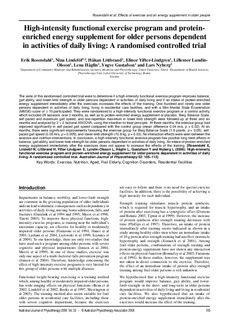| dc.contributor.author | Rosendahl, Erik | |
| dc.contributor.author | Lindelöf, Nina | |
| dc.contributor.author | Littbrand, Håkan | |
| dc.contributor.author | Yifter-Lindgren, Elinor | |
| dc.contributor.author | Lundin-Olsson, Lillemor | |
| dc.contributor.author | Håglin, Lena | |
| dc.contributor.author | Gustafson, Yngve | |
| dc.contributor.author | Nyberg, Lars | |
| dc.date.accessioned | 2017-06-07T12:40:06Z | |
| dc.date.available | 2017-06-07T12:40:06Z | |
| dc.date.issued | 2006 | |
| dc.identifier.citation | Rosendahl, E., Lindelöf, N., Littbrand, H., Yifter-Lindgren, E., Lundin-Olsson, L., Håglin, L., Gustafson, Y. & Nyberg, L. (2006) High-intensity functional exercise program and protein-enriched energy supplement for older persons dependent in activities of daily living: a randomised controlled trial. The Australian journal of physiotherapy, 52(2), s. 105-113. | |
| dc.identifier.uri | http://hdl.handle.net/11250/2445137 | |
| dc.description | Artikkelen rapporterer en studie hvor hensikten var å vurdere om et høyintensivt fysisk treningsprogram har effekt på balanse, gangfunksjon og beinstyrke hos eldre mennesker bosatt i institusjon. | |
| dc.description.abstract | The aims of this randomised controlled trial were to determine if a high-intensity functional exercise program improves balance, gait ability, and lower-limb strength in older persons dependent in activities of daily living and if an intake of protein-enriched energy supplement immediately after the exercises increases the effects of the training. One hundred and ninety-one older persons dependent in activities of daily living, living in residential care facilities, and with a Mini-Mental State Examination (MMSE) score of ? 10 participated. They were randomised to a high-intensity functional exercise program or a control activity, which included 29 sessions over 3 months, as well as to protein-enriched energy supplement or placebo. Berg Balance Scale, self-paced and maximum gait speed, and one-repetition maximum in lower-limb strength were followed-up at three and six months and analysed by 2 x 2 factorial ANCOVA, using the intention-to-treat principle. At three months, the exercise group had improved significantly in self-paced gait speed compared with the control group (mean difference 0.04 m/s, p = 0.02). At six months, there were significant improvements favouring the exercise group for Berg Balance Scale (1.9 points, p = 0.05), self-paced gait speed (0.05 m/s, p = 0.009), and lower-limb strength (10.8 kg, p = 0.03). No interaction effects were seen between the exercise and nutrition interventions. In conclusion, a high-intensity functional exercise program has positive long-term effects in balance, gait ability, and lower-limb strength for older persons dependent in activities of daily living. An intake of protein-enriched energy supplement immediately after the exercises does not appear to increase the effects of the training. | |
| dc.language.iso | eng | |
| dc.relation.uri | http://www.sciencedirect.com/science/article/pii/S0004951406700459 | |
| dc.subject | Sverige | |
| dc.title | High-intensity functional exercise program and protein-enriched energy supplement for older persons dependent in activities of daily living: a randomised controlled trial | |
| dc.type | Journal article | |
| dc.type | Peer reviewed | |
| dc.rights.holder | Erik Rosendahl | |
| dc.identifier.doi | https://doi.org/10.1016/S0004-9514(06)70045-9 | |
